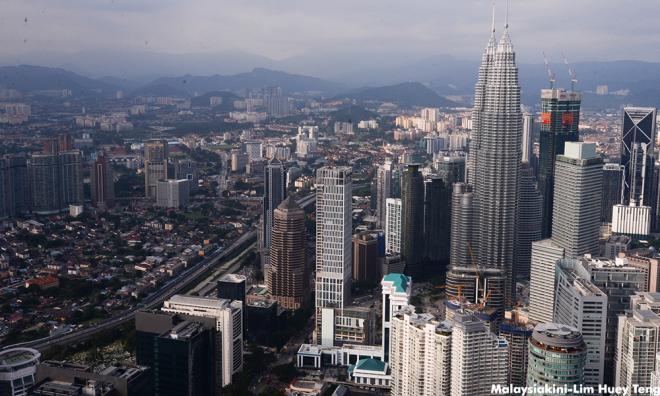
While the Malaysian government may have its hands full with unveiling one economic stimulus package after another during the current Covid-19 pandemic, it also has to look into the oil and gas revenue, tourism receipts, and unstable commodity prices in shaping the country's economic direction, according to an expert.
Kanes Rajah, executive director of London-based Centre for Executive and Professional Development, said the projects which had been approved so far by Putrajaya were mainly to address urgent needs.
The government announced a RM260-billion economic stimulus package immediately following the Covid-19 pandemic.
This was followed by another RM35-billion short-term National Economic Recovery Plan (Penjana).
"(Hence), it is hard to assess how these can lead to enduring benefits to the economy, particularly for jobs and to inspire investor confidence,” Rajah told Bernama.
The government is using the 6R approach to fight the Covid-19 pandemic and recover from its socio-economic fallout, namely Resolve, Resilience, Restart, Recovery, Revitalise, and Reform.
Penjana falls under the Recovery phase while the 2021 Budget later this year will aim to Revitalise and Reform under the 12th Malaysia Plan 2021-2025.
“The loss of oil revenue from Petronas (Petroliam Nasional Bhd) by more than half of that projected, the continuing instability of commodity prices and cancellation of 'Visit Malaysia 2020' for the tourism industry with spillover effects are further blows that the government must plan for," he said.
The don reiterated that the downturn in the global economy, corporate closures, and job losses, a scale back on non-essential manufacturing and its effect on consumer spending were entirely difficult for even the more advanced economies to handle.
Malaysia’s economy expanded by 0.7 percent in the first quarter of this year, but a deeper contraction is expected in the second quarter due to the pandemic, before recovering in the third quarter of the year.
The country has previously been actively rolling out mega infrastructure projects, with an estimated RM146 billion worth of infrastructure-related contracts slated to be rolled out from 2019 onward.
However, no thanks to Covid-19, these projects have slowed down to the extent that essential maintenance and upgrading of existing infrastructure have also been halted.
"The movement control order (MCO) imposed restrictions on the movement of labour and materials and therefore logistics involved in transporting plant and equipment via roads, rail, ships, and air have all been affected," he explained.
Commenting on the current leadership, Rajah said Prime Minister Muhyiddin Yassin has moved swiftly to appoint a full cabinet and get on with the task of governing the country, but the disruption caused by Covid-19 and the MCO that followed has prevented the new government from convening Parliament and present its budgets for approval.
"In addition to this, the recent announcements that henceforth see government-linked companies having new leaderships from the ranks of members of Parliament, some of whom are relatively inexperienced in corporate roles, have raised some concerns about such actions and their impact on the respective institutions and the country," he said.
The appointment of a corporate figure in the cabinet means he needs more time although he has taken up these challenges at an extraordinarily turbulent time in the markets and in the economy worldwide.
"They have much to demonstrate to business leaders/public about their competence in initiating policy-driven fiscal stimulus and balancing the books for the nation.
"They are also at the mercy of and reliant upon stability in the markets and tax revenues, both of which will not be available in the short to medium term. So, they have a challenging period ahead.
"They need the full support of all government institutions and corporate leaders to drive through financial measures that can grow the economy," he added.
Asked on the important sectors to focus on, Rajah emphasised that technology-based small and medium enterprises such as high-tech startups that need fresh tranche of venture capital are struggling to get investment as high net worth investors have dried up due to the shutdown in many economies.
On health, he said, there should not be a rush to lift the MCO completely until all steps are in place for social distancing, ‘to test, track and trace’, and there is enough personal protective equipment for all essential workers.
Other important areas, he said, are education, especially in supporting primary, secondary and tertiary education in developing new and innovative ways to embrace digital technologies and social media to offer successful learning and teaching experiences, food supplies, as well as a review of housing, particularly for foreign workers.
In 2018, Rajah was appointed as adviser to the Minister of Entrepreneur Development Ministry (MED), Malaysia and permanent member of the Entrepreneur Development Advisory Council (EDAC), MED. This was renewed in January 2020.
- Bernama



No comments:
Post a Comment
Note: Only a member of this blog may post a comment.